Job Interview Statistics by Country, Industry, Demographic and Avg. Interview Length
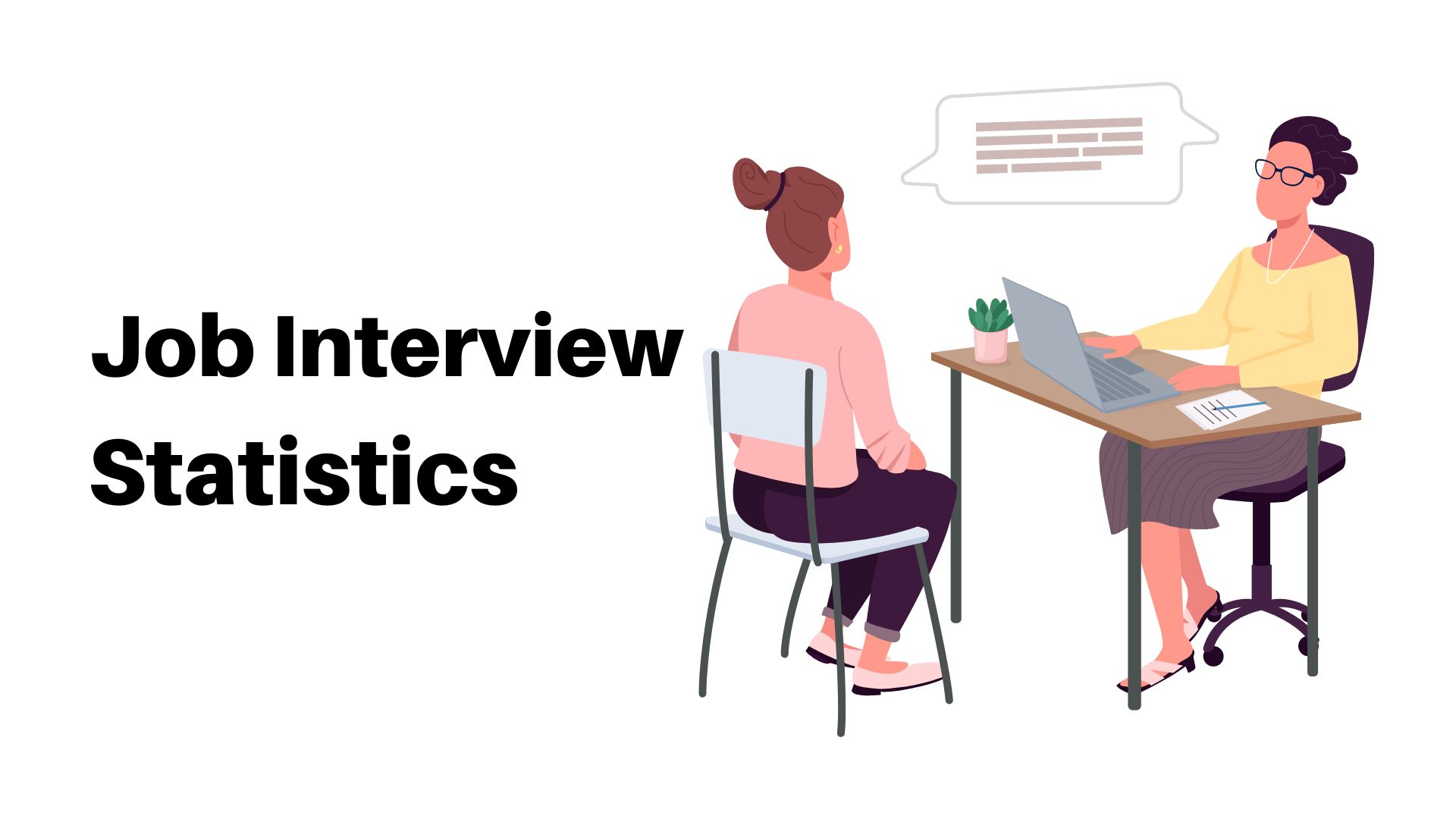
Page Contents
- Introduction
- Editor’s Choice
- What is Job Interview?
- General Job Interview Statistics
- Job Interview Statistics Via Phone Calls or Virtual
- Job Interview Hiring Statistics
- How Many Interviews Does It Take to Get Job Statistics?
- Job Interviews by Country
- Job Interviews by Industry
- Job Interviews by Demographic
- Average Length of Interview Statistics
- Job Interview Failures Statistics
- What Impacts the Decision to Hire a Candidate During an In-Person Interview?
- Final Words
Introduction
Job Interview Statistics: Conducting job interviews is an integral component of working recruitment activities worldwide. According to statistics, interview procedures vary significantly between businesses and employment positions – lasting anywhere between 30 minutes to several hours depending on how difficult a position may be and the recruiting technique employed by an organization.
According to a Glassdoor poll, job seekers typically experience two to three rounds of interviews before receiving an offer of employment. Furthermore, data demonstrates that those with greater odds of success during interviews tend to prepare in advance by conducting thorough due diligence on businesses involved, practicing interview techniques, and being familiar with typical interview questions – these methods increase chances of getting employment offers.
Additionally, interview formats may differ – some businesses opt for phone or video interviews instead of in-person sessions. According to certain data, video interviews have become more prevalent as remote employment and online recruiting processes gain prominence. Job seekers may better prepare themselves for interviews by becoming informed of job interview statistics.
- The typical interview procedure; lasts 23 days.
- There is a 26.24% chance; that every job seeker will secure an offer for employment.
- Probability of hiring after three interviews stand at 51%.
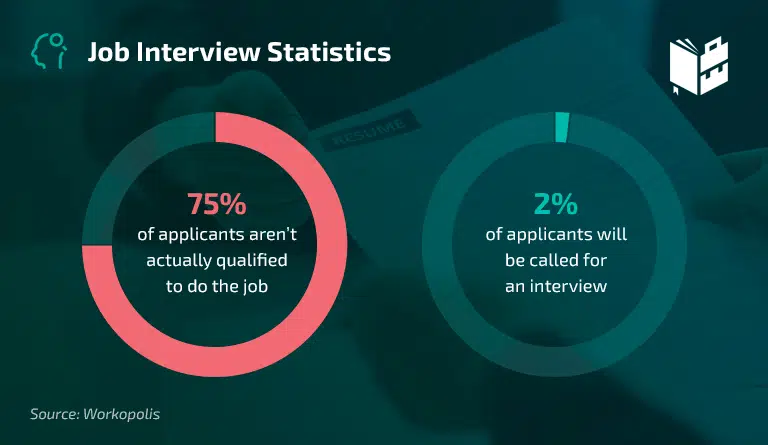
(Source: whattobecome.com)
Editor’s Choice
- Only 20% of applicants are chosen to be interviewed.
- New employees only have seven seconds to make a good first impression and gain acceptance into an organization.
- 91% of recruiters prefer candidates with job experience over those without.
- 71% of employers reject candidates who do not present themselves suitably for work.
- At a corporate level, each position typically receives 250 candidates on average.
- According to experts in the field, hiring processes typically take 42 days on average.
- An interview conducted favorably is said to influence 87% of job seekers' opinions about an organization or job opportunity.
- 33% of recruiters make a decision whether or not to hire an applicant within 90 seconds.
- Hotel sector hirers complete their hiring procedures within 10 days.
What is Job Interview?
Job interviews serve to ascertain a candidate's suitability for a given role or position, and are conducted formally between an applicant and representative(s) from a business or organization. They play an essential part in the hiring process and typically occur following an initial screening of applicants. Although most job interviews take place face-to-face, others can also be done over the phone or video conferencing; throughout these discussions, the candidate will likely be questioned regarding credentials, professional experience, talents, personality attributes as well as other pertinent matters such as problem-solving abilities by asking behavioral or situational related queries from the interviewer(s).
Dependent upon a company's employment policies and culture, interviewing can either be formal or casual. Interviews may range from formality and structure to informality and allow an applicant to show off their personality and interpersonal abilities. Job hunters should perform research on both the firm and position they're seeking as well as typical interview questions before their interviews. Feeling prepared and confident during an interview increases candidates' odds of success; after each interview is over, businesses typically evaluate applicants before selecting someone for hire based on an assessment or other measures such as further interviews/tests to narrow the field further.
General Job Interview Statistics
Recent data demonstrates how the COVID-19 epidemic has altered hiring processes significantly. Employers now often utilize video interviews for applicant assessment due to remote employment and virtual recruiting practices.
- Indeed conducted a poll which revealed that 67% of companies use video interviews as part of their recruiting processes, representing an impressive increase from pre-pandemic levels.
- As virtual interviews become more prevalent, interview times have decreased drastically. According to a Glassdoor poll, an interview now typically lasts 30 minutes as opposed to 55.
- Recent years have witnessed an upsurge in behavioral interview questions that require applicants to discuss particular circumstances or experiences during job interviews. 91% of hiring managers now employ such questions according to a LinkedIn poll.
- Technical capabilities remain essential, yet more businesses are placing an increased emphasis on soft skills such as communication, flexibility, and problem-solving. According to a LinkedIn poll conducted among hiring managers worldwide, 92% ranked soft skills on par or above technical abilities when considering applicants.
- Candidates who prepare for job interviews stand a higher chance of succeeding given the rising competition for employment. According to a Monster poll, half of job searchers spend at least five hours prepping for an interview.
- As part of their employment processes, businesses typically conduct multiple interviews during the hiring process. A Glassdoor poll indicated that job seekers typically undergo at least 2-3 rounds before receiving an offer of employment.
- Eye contact, according to 67% of recruiters, is critical in creating a lasting positive impression.
- With only seven seconds available to create a lasting first impression, candidates have only seven seconds to make an impactful statement about themselves and establish rapport.
- 47% of job interviewees fail because they were given inadequate information about the employer.
- In the United States, recruiting usually lasts about 23.8 days.
- Over 60% of recruiters use video technology for candidate interviews.
- Female job applicants with children had 36% less of an interview callback rate compared to their male counterparts.
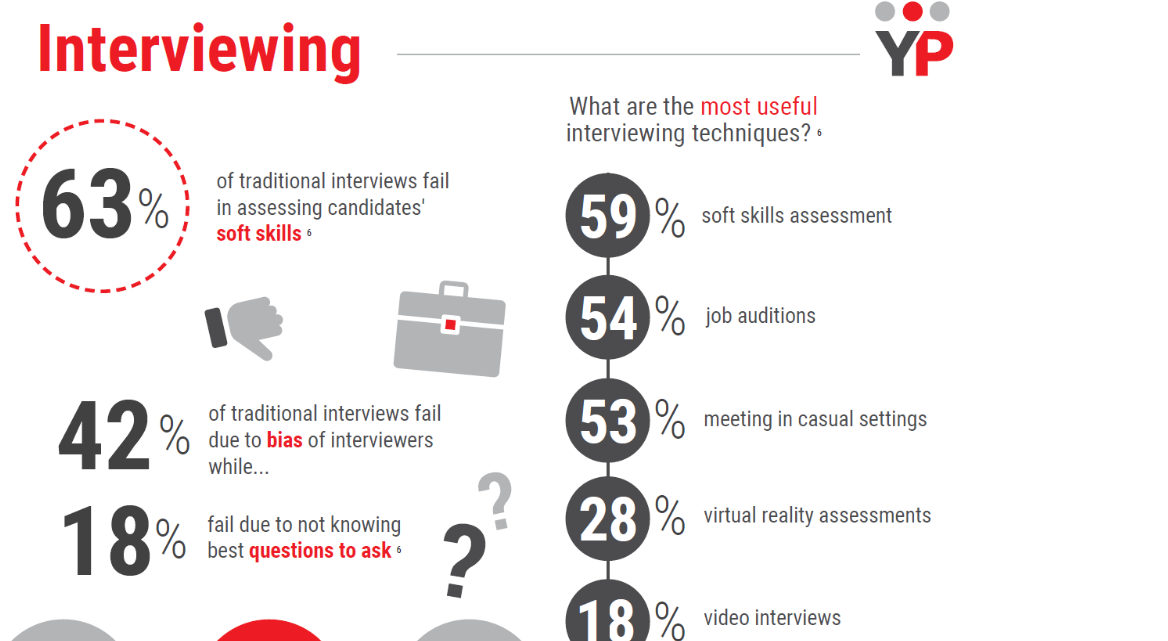
(Source: yourprimerecruitment.com)
Job Interview Statistics Via Phone Calls or Virtual
Phone and video interviews have become more prevalent within the employment process due to remote work and virtual hiring procedures.
- There has been an exponential growth of virtual interviews since pre-pandemic levels; 86% of businesses utilize them in their employment process according to Gartner research. This represents a substantial jump from pre-pandemic levels.
- Even today, phone interviews remain prevalent; while video interviews may become more prevalent over time, companies still conduct telephone interviews as often. A LinkedIn poll recently found that 60% of job applicants interviewed had at least one telephone interview in 2018.
- Virtual interviews may be made difficult by technical challenges, including weak internet connectivity, audio issues, and video freezing. A TopResume poll revealed that 33% of job seekers experienced technical issues during virtual interviews.
- As technical challenges may be more likely and lack of engagement is absent in virtual interviews than traditional ones, virtual interviews may be more stressful for applicants than in-person ones, according to a HireVue poll which showed 80% of applicants thought virtual interviews were more stressful than in-person ones.
- Employers are adopting new technology: Employers have been turning to tech to accelerate the interview process and evaluate candidates more quickly, such as chatbots, video interviewing software, and AI-powered evaluations.
- Preparation is still key: candidates who come prepared for phone and online interviews are more likely to find success, according to a TopResume poll, while 51% spend at least two hours prepping for virtual interviews.
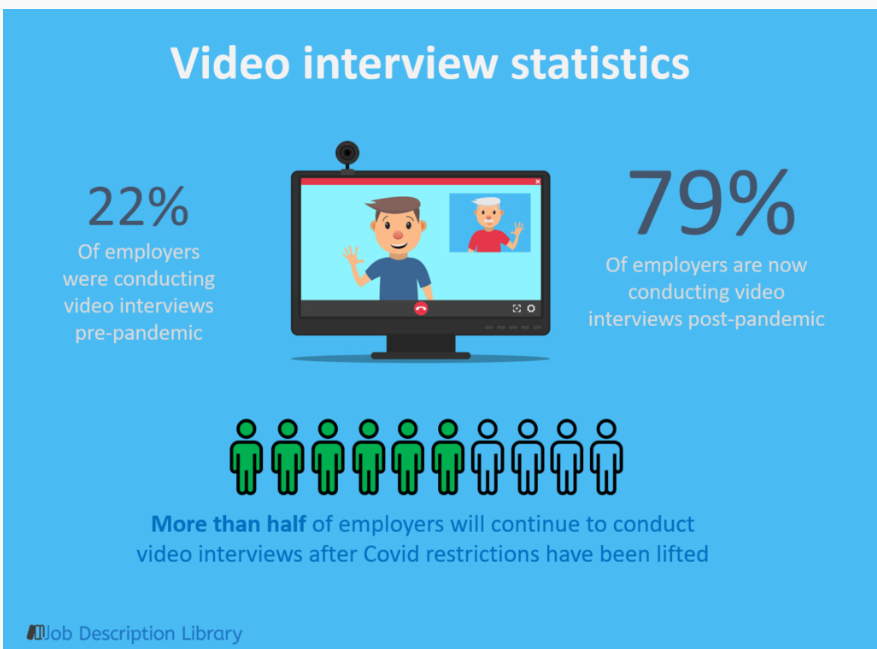
(Source: standout-cv.com)
Job Interview Hiring Statistics
Job interviews are an integral component of the recruiting process as they enable employers to assess a potential employee's credentials, experience, and suitability for a particular position.
- Glassdoor poll results reveal an average success rate for job interviews of approximately 2%; meaning out of 100 applicants only two are hired – underscoring how competitive the job market can be and the importance of proper preparation prior to interviews.
- Employers typically take several weeks or months after conducting extensive interviews before making their hiring decision, according to a Workable poll. On average, it takes 36 days for employers to hire new employees.
- Job interviews can play a vital role in encouraging inclusion and diversity within the workplace. A LinkedIn poll found that 72% of hiring managers believed diversity to be essential to their firm's success; 78% agreed a diverse staff leads to superior business results.
- Businesses already utilizing video conferencing software for conducting job interviews have increased their use of virtual interviews due to COVID-19; 68% of employers, according to a poll by Indeed, have expanded their virtual interview usage because of it.
- Unconscious bias can present interviewers with serious challenges when conducting job interviews; 58% of job applicants reported encountering such prejudice during an interview according to a LinkedIn poll.
How Many Interviews Does It Take to Get Job Statistics?
The number of interviews necessary to secure employment can depend on several factors including industry, firm size, position level, and the state of the labor market. Current estimates show that job applicants usually must go through four to five interviews before receiving an offer of employment; this number may change according to individual candidate circumstances and employer recruiting procedures; as well as competition for that post.
Be mindful that not all job seekers find success at once in the job hunt process; some may receive multiple job offers after only a few interviews; for others, it could take longer and depend on factors such as background, credentials, and interviewing abilities of job applicants. Persistence and focus are necessary components for job searching success when faced with rejection; job seekers should keep searching out suitable jobs that match their talents and interests while working to perfect interviewing abilities as well as tailor application materials accordingly.
Employers can streamline the hiring process and reduce interviews by being clear with job seekers about job descriptions and criteria as well as staying in constant communication during recruitment, helping ensure an easy application process and a greater chance of finding suitable matches between job searchers and employers. Together they can accelerate recruitment procedures and improve chances of finding ideal positions together.
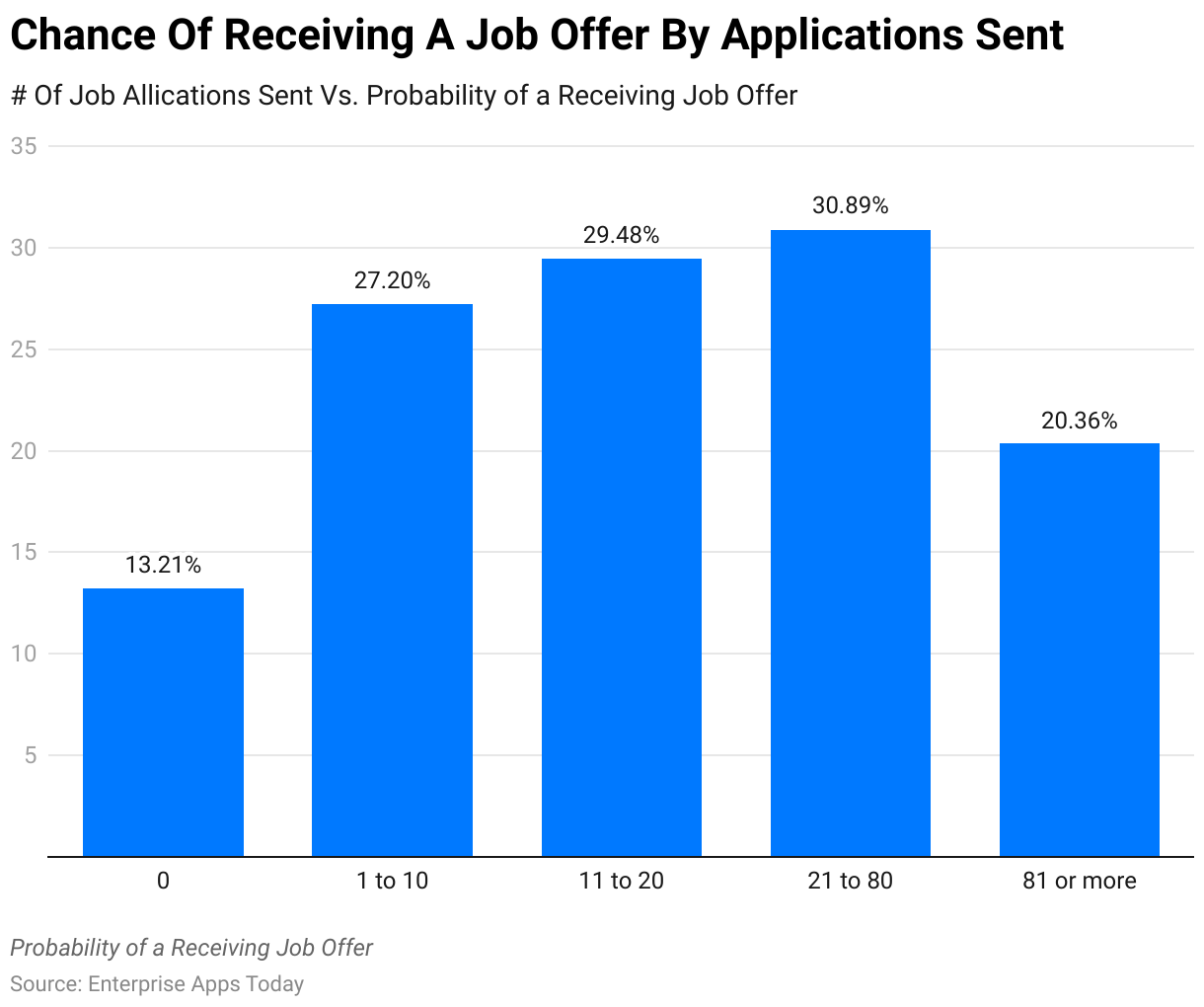
(Reference: zippia.com)
Job Interviews by Country
Country, culture, and industry may all influence how job interviews are conducted.
- United States: In-person and phone interviews are two of the most prevalent interview formats here; 83% of American job applicants have undergone an in-person interview while 62% have had an interview via phone, as per a Glassdoor poll.
- UK: Video interviews have become more prevalent across British businesses in recent years; 76% according to a Totaljobs poll now utilize them as part of the employment process.
- Australia: Group interviews have become a standard practice in some sectors such as retail and hospitality. A Seek poll revealed that 47% of Australian job seekers had participated in at least one group interview.
- Canada: Recently, behavioral interview questions have become more popular in Canada; 72% of hiring managers use such questions regularly according to a Robert Half poll.
- Germany: Companies in Germany often require applicants to submit both a detailed CV and cover letter as part of the application process, according to Hays poll results, as 96% of employers consider the latter component essential in making their selection decisions.
- Japan: Hiring procedures in Japan tend to be very formalized. A Hays poll revealed that 55% of Japanese companies conduct panel interviews while 73% use standardized interview questions during hiring processes.
- Indian job interviews typically inquire into candidates' family histories and personal lives during job interviews, according to CareerBuilder India polling data. 19% of applicants reported being asked about their marital status while 9% were asked if they planned on having children in one or more interviews, according to this poll by CareerBuilder India.
Job Interviews by Industry
Industry-specific hiring methods may differ as well.
- Technology: Coding challenges and technical interviews have become more prevalent within the technology sector; 75% of technical recruiting managers utilize coding challenges while 52% use technical interviews when assessing candidates according to a HackerRank poll.
- Healthcare: To evaluate applicants in healthcare firms, behavioral interviews, and skills tests are regularly employed as evaluation methods. According to a HealthcareSource study, 58% use behavioral interview questions while 54% utilize skills evaluations as evaluation measures.
- Retail: Situational judgment tests and group interviews have long been standard procedures in retail settings. According to research from the National Retail Federation, 55% of retailers conduct situational judgment tests while 62% conduct group interviews.
- Case interviews and technical questions are widely employed as assessment methods in the financial sector. According to a Wall Street Oasis study, 77% of financial professionals had taken part in at least one case interview and 72% had been asked technical questions during an assessment interview.
- Education: Panel discussions and teaching demonstrations are standard practices within the educational field. A TopResume poll revealed that 56% of educators had taken part in panel interviews while 55% have been asked to demonstrate their teaching methods.
- Creative Industries: Portfolio evaluations and creative activities are used as measures of competency when hiring applicants in creative industries such as marketing and advertising. A study by The Creative Group revealed that 58% of creative professionals participated in a portfolio review; another 54% had been asked to participate in one.
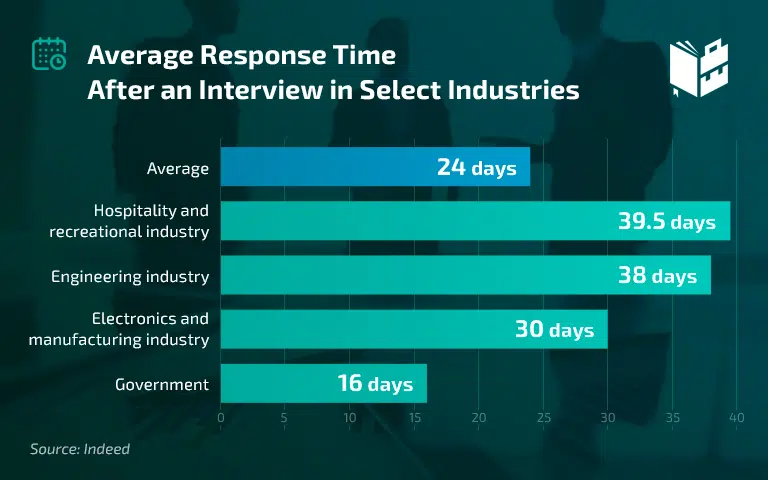
(Image Source: whattobecome.com)
Job Interviews by Demographic
AGE
- Age discrimination is a prevalent worry among job searchers as older applicants may encounter prejudice and unfavorable perceptions during the hiring process. A recent AARP poll discovered that 33% of workers over 55 have witnessed age discrimination at work.
- Older job seekers frequently experience longer stretches of unemployment compared with younger workers, according to research conducted by the Bureau of Labor Statistics. According to this data, employees aged 55 years old or more experienced an average length of unemployment of 34.5 weeks during 2022; workers between 25-34 experienced 22.1 weeks.
- Recent years have witnessed an uptick in remote job interviews, particularly during the COVID-19 pandemic. Due to technological or internet connectivity concerns, elderly job seekers may face difficulty during virtual interviews; 41% of workers over 50 reported having tech issues during virtual interviews according to a FlexJobs poll.
- Aged candidates often possess extensive abilities and experience that make them invaluable during the hiring process. Indeed's poll showed that employers typically place greater value on experience rather than education when assessing candidates for jobs.
- Many firms actively hire older workers because they recognize the advantages of age diversity in the workplace. A Harvard Business Review poll showed that 57% of HR executives believe age diversity enhances corporate effectiveness.
- Research indicates that 95% of individuals make efforts to appear younger during job interviews in an attempt to increase their odds of employment.
GENDER
- Many job searchers are acutely aware of gender discrimination as it often leads to prejudiced comments during job interviews and harmful preconceptions being applied against women in general. 42% of women reported encountering some form of gender discrimination at their workplace, according to a Pew Research Center poll.
- Women often face gender wage disparities during job interviews, which may prove troublesome. Glassdoor research reveals that by 2022 women will make only 81 cents for every dollar earned by males in America.
- Gendered interview questions regarding family or marital status are increasingly asked of women during job interviews in many countries. According to a Monster poll, 75% of female job interviewees report being asked about their family plans during an interview process.
- Women may experience limited career development opportunities as a result of being underrepresented in leadership positions, according to a Catalyst poll which found only 29% of top executive roles globally are held by women.
- Many firms actively pursue hiring more women because they understand the advantages of gender diversity in the workplace. According to McKinsey research; those in the top quartile for gender diversity are 25% more likely to achieve above-average profitability than those in the worst quartile for gender diversity.
- Men tend to feel 33% more secure about how they will perform during job interviews than women do.
RACE
- Job applicants from minority racial groups often worry about discrimination when applying for jobs; evidence points to its ability to influence employment decisions. According to research by the National Bureau of Economic Research, job candidates whose names sound African-American are 50% less likely to receive callbacks compared with candidates whose names sound white.
- Minority job searchers generally experience greater rates of unemployment compared to white job hunters; according to the Bureau of Labor Statistics, Black unemployment stood at 9.7% as of April 2022 while it stood at 5.3% for Whites.
- Education level may influence employment prospects and interview success, yet structural impediments may make acquiring higher education more challenging for those from minority racial groups seeking work. According to National Center for Education Statistics data from 2021, white students graduated at an 89% rate versus 81% for Black students.
- Employers may help combat racial bias during job interviews by offering hiring managers bias training and to implement inclusive recruiting procedures. According to Society for Human Resource Management research, 44% of firms educate hiring managers about unconscious prejudice.
- 77% of hiring managers consider diversity a fundamental aspect of job interviews and recruitment processes.
EDUCATION
- Higher-educated job seekers typically enjoy lower unemployment rates. According to the Bureau of Labor Statistics, the unemployment rate among job hunters with bachelor's degrees or greater was 3.7% in April 2022 while it stood at 7.5% among those without any college education beyond a high school diploma.
- Salary potential can also depend on one's educational level. According to a survey by the Bureau of Labor Statistics, full-time workers holding bachelor's degrees averaged earning an estimated weekly average wage of $1,305 as opposed to $746 among those holding only high school diplomas in 2022.
- Researchers suggest that education could have an effect on interview performance; job candidates with higher levels of schooling may be better prepared for job interviews. A research article published by the Journal of Applied Psychology revealed a correlation between improved interview performances and higher school levels.
- Education often correlates to enhanced levels of skill and qualification, which has an impact on job seekers' abilities and credentials. Candidates with specific educational backgrounds could be highly sought after by employers.
- Higher educational levels may also increase the probability that job candidates explore opportunities for professional growth and further education, potentially impacting their performance during job interviews. A LinkedIn poll revealed that 94% of recruiters believe furthering education increases job prospects' chances of success.
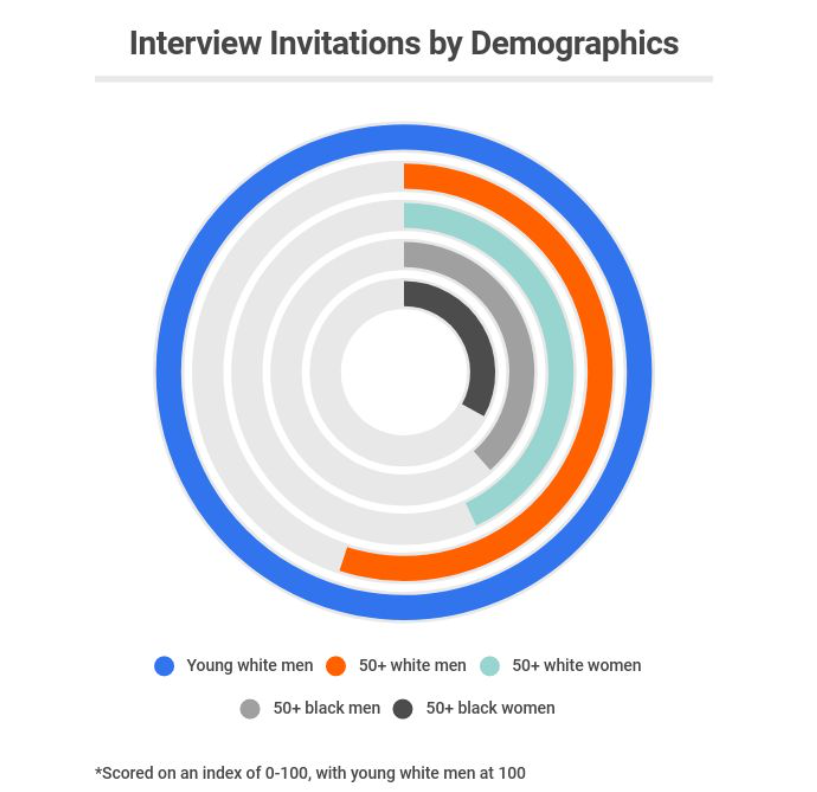
(Source: zippia.com)
Average Length of Interview Statistics
Industry, position, and employer factors all may contribute to the length of an interview session.
- Traditional in-person job interviews usually last 30 to 60 minutes. 59% of interviews according to a Glassdoor poll took between 30 minutes and one hour to complete.
- Virtual job interviews – those conducted over the phone or video – tend to take less time than in-person ones, typically lasting 10-30 minutes according to a TopInterview poll.
- Businesses conducting recruitment interviews typically conduct multiple job interviews as part of the recruiting process, with job hopefuls generally anticipating attending two to three interviews before receiving an offer of employment. According to Robert Half research, 67% of businesses conduct multiple interviews for each candidate before offering them employment.
- Interviews for executive-level roles tend to last longer than usual. According to a Korn Ferry poll, such interviews can last four hours or longer.
- Group interviews often last two hours or more due to multiple candidates being interrogated at once, which impacts their duration.
- In the United States, job interviews typically last 27.5 days.
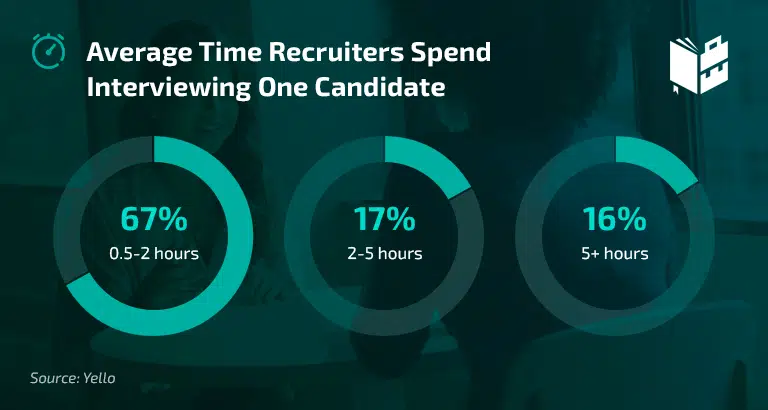
(Source: jobcase.com)
Job Interview Failures Statistics
Failure at a job interview can be both frustrating and demoralizing for job seekers. Although not every interview will result in an offer of employment, being informed about its statistics and causes can help protect against this unfortunate fate.
- Based on a poll conducted by CareerBuilder, 49% of employers stated that job candidates' lack of preparation can cause them to fail job interviews. This includes failing to perform adequate company or job research beforehand, as well as not practicing for and dressing appropriately for interviews.
- Communication during job interviews is of utmost importance and failure can result from inadequate techniques of communication. A Robert Half poll revealed that 31% of hiring managers reported candidates with poor communicative abilities as the main cause of unsuccessful interviews.
- While being confident may help in job interviews, being overconfident or arrogant could put off potential employers. A Monster poll revealed that 22% of employers blamed overconfidence or arrogance as the cause for candidates failing job interviews.
- Employers prefer candidates that show enthusiasm and passion about the job and organization they are applying to, making an interview less likely to fail due to an absence of excitement about working together or applying. A poll conducted by TopInterview revealed that 11% of employers blamed lack of passion as the cause for failed interviews.
- Adecco conducted a poll and discovered that 71% of employers reported turning down an applicant due to inappropriate behavior such as arriving late or acting rudely during their interview process.
- According to 50% of hiring managers, appearance, and behavior during a job interview could disqualify candidates from further consideration for an opening.
- 40% of recruiters won't work with applicants who lack self-assurance.
What Impacts the Decision to Hire a Candidate During an In-Person Interview?
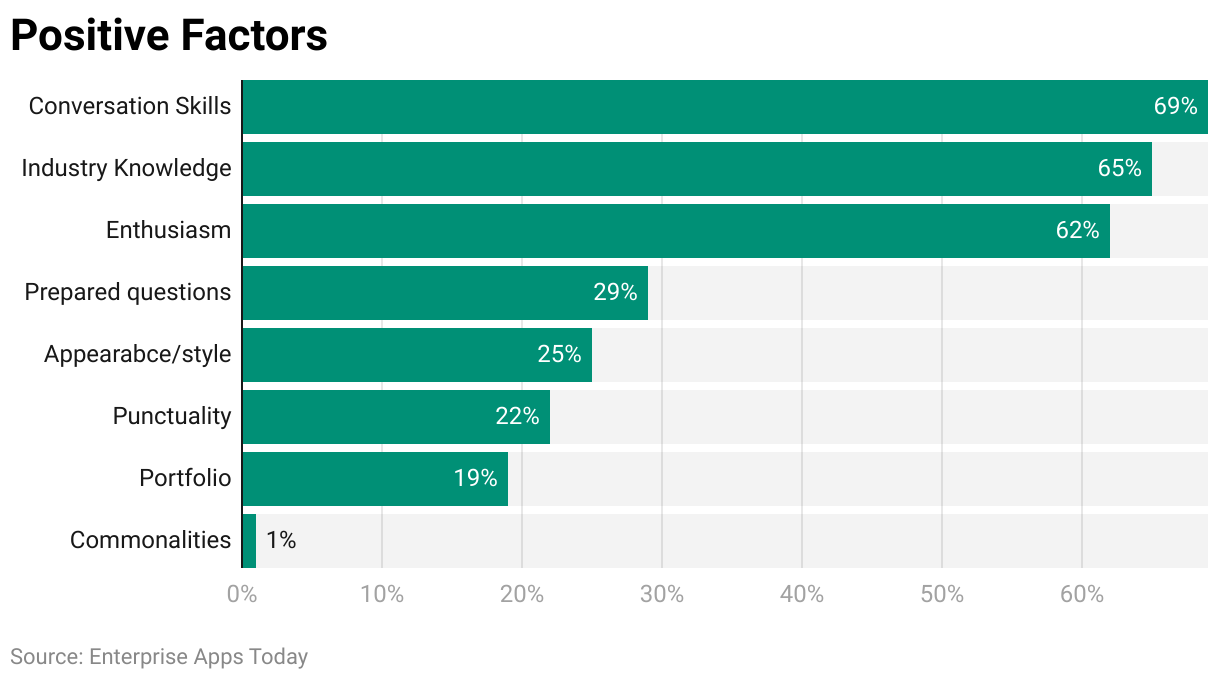
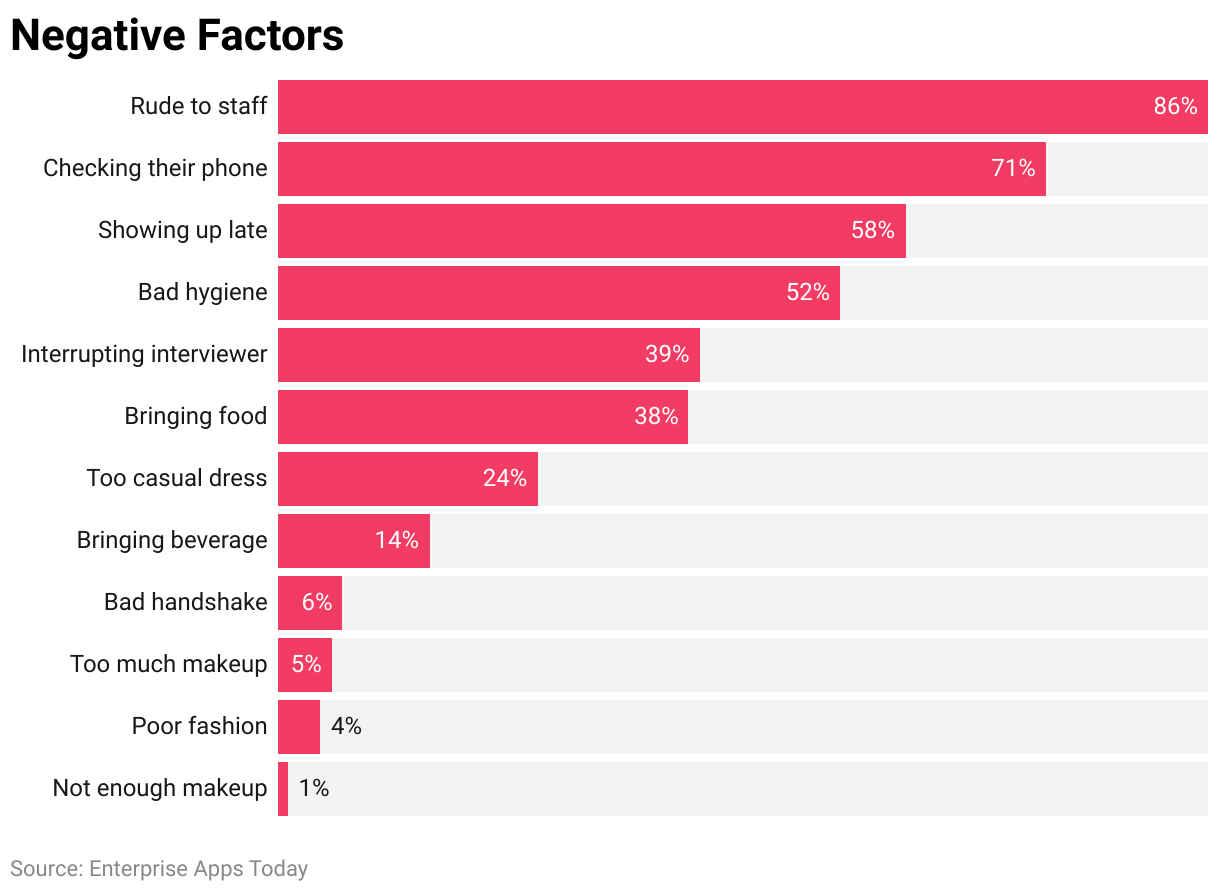
Final Words
Overall, job interviews are an integral component of recruitment processes and both candidates and employers can benefit from being aware of statistical trends and statistics surrounding them. Companies are using AI and skills-based tests to screen job applicants more often and virtual interviews have become more widespread. Soft skills, inclusivity, and diversity have become ever more essential during the interview process.
Job applicants should concentrate on preparation, communication, and professionalism during interviews to increase their odds of success. This involves doing background research on both the business and role as well as creating questions to ask during an interview; all while being enthusiastic and upbeat. Employers may wish to employ various interviewing approaches that evaluate job seekers' abilities, credentials, and suitability for roles within their organizations.
Staying updated with the latest trends and data on job interviews can prove to be beneficial for both job seekers and employers; as it increases their chances of success in the job market and enables them to formulate more efficient recruiting procedures.
Sources
FAQ.
An interview typically has five steps. First is the introduction, in which both candidate and company introduce themselves; small talk is then essential in building rapport, followed by information gathering where applicants give elevator pitches as part of the third step - information gathering; this leads to information exchange in the form of Q&A sessions; finally the last step involves wrapping up and making sure both candidate and business leave with favourable impressions of each other.
While 98% of recruiters claim they provide rejected applicants with feedback after each interview, 30% of candidates claim to have attended at least one interview from which they never heard back from the company - although chances for hospitality candidates hearing back after interviews tend to be greater than other fields.
On average, companies respond within 12 days following an interview; however one out of ten firms may delay this period up to four months or longer.
Employers anticipated that a candidate's job application would be positively impacted by a post-interview follow-up email in 27% of cases, not at all in 61%, and negatively in 12% of cases.

Barry is a lover of everything technology. Figuring out how the software works and creating content to shed more light on the value it offers users is his favorite pastime. When not evaluating apps or programs, he's busy trying out new healthy recipes, doing yoga, meditating, or taking nature walks with his little one.